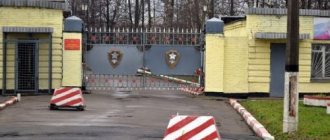ST 215.3 of the Criminal Code of the Russian Federation.
1. Unauthorized connection to oil pipelines, oil product pipelines and gas pipelines, committed by a person subjected to administrative punishment for a similar act -
shall be punishable by a fine in the amount of up to eighty thousand rubles, or in the amount of the wages or other income of the convicted person for a period of up to six months, or by compulsory labor for a term of up to three hundred sixty hours, or by corrective labor for a term of up to one year, or by restriction of liberty for a term of up to two years. , or forced labor for a term of up to two years, or imprisonment for a term of up to two years.
2. The act provided for in the first part of this article, committed in relation to main pipelines, -
shall be punishable by a fine in the amount of up to two hundred thousand rubles, or in the amount of the wages or other income of the convicted person for a period of up to eighteen months, or by compulsory labor for a term of up to four hundred hours, or by corrective labor for a term of up to two years, or by restriction of liberty for a term of up to three years, or forced labor for a term of up to three years, or imprisonment for a term of up to four years.
3. Destruction, damage or otherwise rendering unsuitable for operation condition of oil pipelines, oil product pipelines, gas pipelines, as well as technologically related objects, structures, communications, automation, alarm systems, which resulted or could lead to disruption of their normal operation and were committed from selfish or hooligan motives, -
shall be punishable by a fine in the amount of four hundred thousand to five hundred thousand rubles, or in the amount of the wages or other income of the convicted person for a period of seven months to one year, or by compulsory labor for a term of up to four hundred eighty hours, or by corrective labor for a term of up to two years, or by forced labor. labor for a term of up to five years, or imprisonment for the same period.
4. The acts provided for in part three of this article, committed:
a) by a group of persons by prior conspiracy;
b) in relation to main pipelines, -
shall be punishable by forced labor for a term of up to five years or imprisonment for a term of up to six years.
5. Acts provided for in parts one through four of this article, which through negligence resulted in the death of a person or other grave consequences, -
shall be punishable by forced labor for a term of up to five years or imprisonment for a term of up to eight years.
Commentary to Art. 215.3 of the Criminal Code
1. The subject of the crime (in part 1) is oil pipelines, oil product pipelines, gas pipelines, as well as technologically related objects, structures, communications, automation, alarm systems, and in paragraph “b” of part 2 - main pipelines.
2. The objective side is characterized by alternatively provided actions: a) destruction; b) damage; c) otherwise rendering the relevant objects unusable for operation (for example, by unauthorized tapping into a pipeline).
3. The crime is completed either at the moment of the onset of a socially dangerous consequence in the form of disruption of the normal operation of the relevant objects (material composition), or at the moment of creating a real threat of such a consequence (material composition of a real danger).
4. Theft of oil, petroleum products or gas through unauthorized tapping into a pipeline should be qualified under the totality of Art. 215.3 of the Criminal Code with the relevant provisions of Ch. 21 CC.
5. The subjective side is characterized by direct intent and alternatively provided motives: selfish or hooligan motives.
What can a lawyer offer?
No lawyer gives a guarantee of winning a case, and this is considered normal among professional lawyers. However, every potential client wants to receive quality legal services. In St. Petersburg, K.S. Aleksandrov is engaged in the defense of charges under Article 215.3 of the Criminal Code of the Russian Federation. This is a fairly well-known practicing lawyer, a member of the Leningrad Regional Chamber of Lawyers. He specializes in such crimes, so he will always offer his clients the most rational way out of any situation.
First of all, the lawyer will give comprehensive answers to all the client’s questions. Usually it is necessary to provide advice on general legal issues, as well as provide explanations of certain regulatory and legislative documents. In this case, the lawyer will assess the current situation, predetermine the further development of events, based on the norms of the Code of Criminal Procedure, and offer several defense strategies.
The services provided by lawyer K.S. Aleksandrov differ favorably from one-time legal services in that they are comprehensive. This means that the client receives turnkey protection. He does not need to think about how to defend his rights at each procedural stage. The lawyer draws up the necessary documents, participates in interrogations, initiates additional examinations, and requests that the collected materials be included in the case.
The essence of the strategy for each business is individual. The lawyer guarantees the confidentiality of information received from the client. In addition, all his actions are previously discussed with the client and will in no way cause him harm. Experience of participation in similar cases and analysis of judicial practice allows a lawyer to develop and implement an optimal defense strategy.
A lawyer in St. Petersburg guarantees an open pricing policy. The cost of services is the most exciting issue. Any analyst will confirm that high-quality lawyer services cannot be cheap. This is due to the specialist’s workload and is justified by the large labor costs in preparing for the court hearing.
Second commentary to Art. 215.3 of the Criminal Code of the Russian Federation
1. The commented article describes two independent elements of the crime.
The subject of crimes are oil pipelines, oil product pipelines, gas pipelines, as well as technologically related objects, structures, communications, automation, alarms, or main pipelines.
2. The objective side of the first crime is characterized by unauthorized connection to oil pipelines, oil product pipelines and gas pipelines (Part 1), as well as to main pipelines (Part 2). Connection without proper permission should be considered unauthorized.
The crime is considered completed from the moment the act is committed. If consequences occur in the form of carelessly causing the death of a person or other serious consequences (for example, causing serious harm to health, environmental pollution, etc.), then the act is qualified under Part 5 of Art. 215.3 CC.
3. The objective side of the second crime (Part 3) covers three alternatively specified actions:
1) destruction;
2) damage;
3) otherwise rendering oil pipelines, oil product pipelines, gas pipelines, as well as technologically related objects, structures, communications, automation, alarm systems unusable for operation (power outage, cessation of water supply in the water cooling system of electric motors of main pumping units, etc.); P.).
Destruction is the bringing of objects into a state that does not allow them to be used for their intended purpose. Damage is considered to be such a negative change in these objects, as a result of which they are partially deprived of the ability to be used in accordance with their intended purpose. Other methods of rendering life support facilities unusable may not violate the physical integrity of the facility, but make it unavailable for use for its intended purpose: creating obstacles to access to these facilities, littering the water in the water intake area, etc.
The crime is considered completed either from the moment the consequences actually occur in the form of disruption of the normal operation of the relevant facility, or from the moment a real danger of such a consequence is created.
Criminal liability for committing a crime set out in Part 3 of Art. 215.3, is amplified if it was committed by a group of persons by prior conspiracy (clause “a”, part 4), in relation to main pipelines (clause “b”, part 4) or resulted in the death of a person through negligence or other grave consequences ( part 5).
4. Disruption of the normal operation of the pipeline through unauthorized tapping into it, associated with the theft of crude oil, petroleum products or gas, must be qualified under the totality of Art. 215.3 and clause “b”, part 3, art. 158 of the Criminal Code.
5. The subjective side presupposes direct intent. Motive is a mandatory sign of the subjective side for the second crime (parts 3, 4); in the law it is indicated alternatively - selfish or hooligan.
6. The subject of the crime is a person who has reached the age of 16 years. For the first crime (parts 1 and 2), it must, in addition, be punished for committing an administrative offense under Art. 7.19 Code of Administrative Offenses of the Russian Federation. A person is considered subject to this punishment from the date the resolution imposing an administrative penalty comes into force and until the expiration of one year from the date of completion of execution of this resolution (Article 4.6 of the Code of Administrative Offenses of the Russian Federation).
Commentary on Article 215.1 of the Criminal Code of the Russian Federation
1. The public danger of a crime consists of undermining the public security of Russia, causing death or serious harm to a person’s health, or causing major damage to the owner.
The main elements of the crime are described in Part 1 of the comment. articles and reveals socially dangerous acts included in the category of minor crimes. The qualified crime is described in part 2 of the comment. articles and reveals socially dangerous acts included in the category of crimes of medium gravity.
2. The main object of the criminal attack is public safety in the field of energy supply. Optional objects can be human health and property relations. In a qualified crime, human life is an additional object of attack.
3. The objective side of the crime is expressed, as a rule, in the form of action - active behavior aimed at illegal: a) stopping the supply of electricity to consumers; b) limiting the supply of electricity to them; c) disconnecting them from other sources of life support. The listed actions may be associated with illegally limiting the supply of electricity, water, gas or other sources of life support to the population. Criminal inaction is also possible, for example, in the case of an illegal refusal by the guilty person to operate a source of energy supply (from supplying energy in the proper amount).
3.1. Illegal termination of the supply of electricity to consumers is the actions of an official or person performing managerial functions in a commercial or other organization, carried out contrary to the law, by-laws and regulations, aimed at completely depriving consumers of electricity.
3.2. Illegal restrictions on the supply of electricity to consumers are actions carried out contrary to the law, by-laws and regulations by an official or person performing managerial functions in a commercial organization, aimed at partially depriving consumers of electricity.
3.3. Illegal disconnection of consumers from other sources of life support is the actions of an official or person performing managerial functions in a commercial or other organization, carried out contrary to the law, by-laws and regulations, aimed at stopping the water supply, gas supply or heat supply during the heating season, as well as telecommunications.
4. A mandatory feature of the objective side of a crime is the means of committing it: a) electrical energy; b) other sources of life support.
4.1. Electrical energy is expressed in the directed movement and interaction of charged particles and plays a leading role in the life support of society.
4.2. Other sources of life support include water, gas, telecommunications, etc.
5. According to the legislative structure, the corpus delicti provided for in Part 1 of the comment. article is material. The crime is completed (by composition) at the moment of the onset of any of the material socially dangerous consequences due to negligence: causing major damage, serious harm to human health, other serious consequences as a result of stopping or limiting the supply of electrical energy to consumers, disconnecting consumers from other sources of life support.
5.1. Major damage is considered to be damage whose amount exceeds 500 thousand rubles. (see note to Article 216).
5.2. For serious harm to human health, see paragraph 9.1 comment. to Art. 216 and comment. to Art. 111.
5.3. Other serious consequences include the occurrence of mass diseases among people or animals, causing harm to the health of moderate severity to two or more persons, stopping production, transport, disorganization of the work of an enterprise, organization, institution and associated significant material costs, including the restoration of destroyed or damaged production equipment, other fixed assets of the enterprise (organization, institution), evacuation of people from a dangerous area, etc. (see also paragraph 10.5 of the commentary to Article 246).
6. The corpus delicti provided for in Part 2 of the comment. article, by legislative design is also material. The crime is completed (by composition) at the moment of the death of a person due to negligence. The death of a person (patient) can occur, for example, if the supply of electrical energy to a hospital is interrupted during surgical operations.
6.1. For the death of a person, see paragraph 11.2 of the commentary. to Art. 247.
7. The subjective side of the crime is characterized by guilt in the form of negligence. For example, a guilty person foresees the possibility of material, socially dangerous consequences as a result of his act, but without sufficient grounds for this he arrogantly hopes to prevent these consequences.
8. The subject of a criminal offense is a sane individual who has reached the age of 16 at the time of committing the crime and holds a position or performs management functions in a commercial or other organization, whose responsibilities include resolving issues of stopping, limiting the supply of electricity to consumers or disconnecting them from other sources of life support.
8.1. If this crime is committed by an official whose circle does not include resolving these issues, then his act should be qualified under Art. 286.
8.2. For information about the official, see the comment. to Art. 285; for a person performing managerial functions in a commercial or other organization, see comment. to Art. 201.





